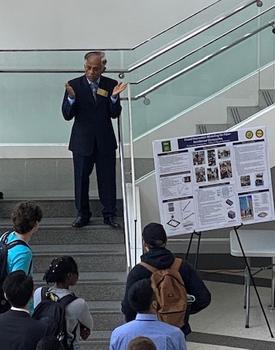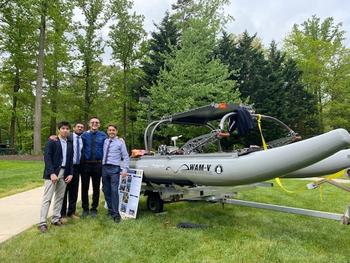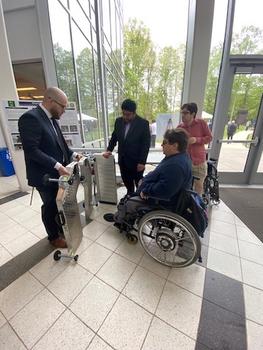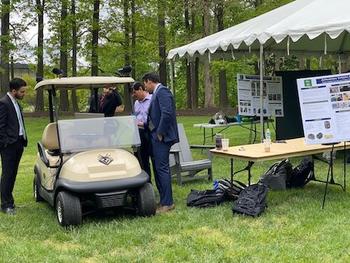In This Story
Right before graduation, George Mason mechanical engineering senior students displayed their capstone projects during their capstone day.

students on Capstone Day
Students showcased the tremendous efforts made during their senior year, and demonstrated the intricacies of project findings. Laid out around the atrium of the Nguyen Engineering building and the lawn outside, the projects included a remote sensing boat, a wheelchair transfer ramp solution, and an alert system for the hearing impaired, along with several others.
“As the director of capstone projects for the mechanical engineering program, it is a treat to see the students’ year-long hard work come to successful conclusion,” says Associate Professor Nathan Kathir. “Our program has ABET accreditation and ABET criteria require a culminating design experience for students before graduation. Mason provides more than a design experience; with 100 percent of our projects sponsored by external partners, we provide a real-world experience and prepare graduates to enter the engineering workforce.”
Maritime RobotX Challenge

Teams Hermes, Poseidon, and Athena all worked together on the Maritime RobotX Challenge, which is an international, university- level competition. The goal is to create an automated maritime vessel that can be controlled remotely, without the need for on-site human control.
Hermes team lead Yasmin Alamin says this project seemed the coolest out of all the capstone projects because of the international component and the chance to demonstrate the autonomous boat in Australia.
“I felt the team lead experience puts me in a place to pursue a career in engineering consulting,” says Alamin. “We went through a lot of experiences with this project like programming learning curves (as MEs), technical challenges, and managing everyone’s time effectively.”
Jafar Hussainy, Poseidon team lead, says the project made him appreciate boats a lot more and the competition is an opportunity to put Mason on the map, and of course, win.
“This will be Mason’s first year participating in the Maritime RobotX Challenge,” says Hussainy. “Being on this project taught me to be more flexible in my mindset and ask others for help.”
It was an interesting project to work on, says Athena team lead Reginal Lockhart.
“I enjoy engineering in all its forms, and this was an interesting challenge to partake in,” he says. “We had a Navy captain offering assistance and contacts in the CIA. It was a cool project.”
The Maritime RobotX Challenge will take place November 2022 in Sydney, Australia.
Wheelchair Transfer Solutions
Designing a light, portable, and easy-to-carry wheelchair transfer device was the objective of capstone project Wheelchair Transfer Solutions (WTS.)

The team designed an aluminum U-shaped transfer system that could be taken apart and put together simply. The device comes with a portable ramp so wheelchair users can use the system for a variety of purposes, such as getting in and out of a car with more ease.
“We chose aluminum as the construction material because it’s lightweight and durable,” says team member and mechanical engineering senior Joe Barbazette. “It’s useful for travel and being on the go.”
The system safely supports up to 400 pounds, is weather resistant, and it can adjust the wheelchair up to six inches of height vertically.
Autonomous Vehicles Alert Systems
As their capstone project, Team Spider-Sense and Team Vibe-Vision worked on a sound recognition system for drivers with hearing impairments. The goal is to enable smooth adoption of autonomous vehicles by the deaf population and to improve safe driving conditions.
The alert system works by detecting sounds from potential hazards, like a siren, and alerting the driver of where the sound is coming from by a real-time visual displayed on a screen near the console. Simultaneously, the driver’s seat cushion will vibrate.

The system has a sound library which the team augmented to include additional sounds such as barking dogs, police sirens, gunshots, and car horns.
Team member and mechanical engineering senior Faiza Al-Bahrani says she uses a cochlear hearing implant and for her, the autonomous vehicle alert system has a 90 percent accuracy.
“I can’t always hear everything going on, and this is a great safety feature while driving,” she says.
The feature basically does the listening for you, she adds, and it can detect the location of a sound so drivers can maneuver around the potential hazard.
According to the team, the alert system is targeted to integrate into any type of vehicle.
A podcast episode featuring capstone day student interviews is available under The Mason Mechanical Engineer title, on most podcasting platforms.
